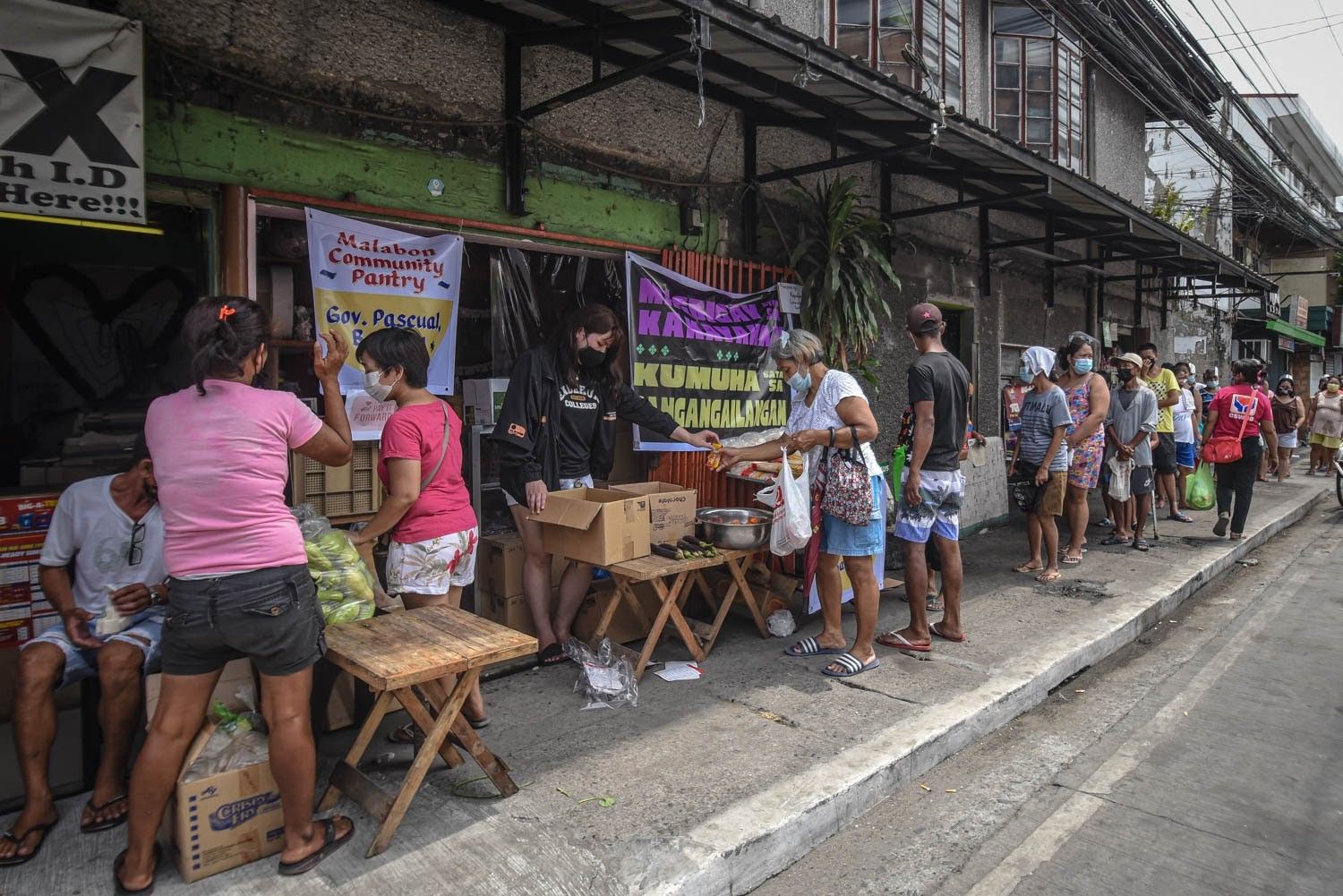Faces and voices of the community around a Malabon pantry

MALABON, Philippines — After setting the tables up and hanging signs for their community, Denise and her group prepare donated provisions for residents who have waited as early as 6 a.m.
Denise and the residents of Baritan show that community pantries are more than just makeshift stalls on random streets.
Denise and her band of helpers bring out food and other essentials in large plastic bags and the goods are divided into two batches per day.
She says an average of 100 people line up for their community pantry each day. With so many to distribute food to, Denise says she is thankful to donors who help provide goods to the pantry.
Donations come from all over the community. Nearby restaurants give food packs and passing pedestrians sometimes donate at random, says Denise.
"It makes me happy because even children were willing to give even what little they have, others would also stop by and donate. This strengthens the bayanihan spirit of our community as it's just not one, but many are those who are willing to give."
Dubbed by some as a modern expression of bayanihan spirit, community pantries hope to provide pandemic-hit communities with goods and other essentials from the community, by the community.
Residents in the area rush to the local community pantry to either share or receive aid, with some getting up very early to avoid the long line.
Cely, a resident of Baritan, says she was in line as early as 6 a.m. to make sure she would be included in that day's batch of beneficiaries.
"Yesterday, I was late. When it was my turn, there were only a few items in the pantry. That was when I realized I need to get up earlier than the others just to get what I need," says Cely.
Even though she has to wake up early, she says the pantry has helped her deal with the effects of the pandemic. "This community pantry was a big help for my family, we lost our jobs and opportunities are scarce. It was difficult to adjust, especially during the pandemic."
Beside Celia was Dahlia, who shared her woes as a single mother living with her son who has special needs. Dahlia said it has been difficult for her and others in Baritan to live nowadays as the pandemic has stripped them of their jobs.
"It's convenient as it lets us live for another day," said Dahlia. "Though it's not for us to consume it everyday, at least it gives us hope even just for a single day."
To tension from law enforcement, some residents helped with the implementation of health protocols. Having witnessed how the organizers were having a hard time controlling the situation as more and more people came to the community pantry, Winnie, who owns a photocopying station beside the community pantry, said assisting was the least that he could do.
"We assisted those who were in need. The community pantry that popped up beside us was a clear chance for us to help others," says Winnie. "Life's already hard, we don't want to make it more difficult for them."
Volunteering on the sidelines is Ronaldo, a pedicab driver. When he has no passengers to drive around, Ronaldo assists the organizers with ensuring health protocols are followed.
"I volunteered so that the situation will be easier, especially on the implementation of the social distancing. For me, that is already a big deal," Ronaldo said.
Spearheading the community pantry in Baritan is Nina Tesorero, project director of Project Pay it Forward.
The community pantry was supposed to be a supermarket stocked with free goods. As the Maginhawa community pantry hit the headlines and the idea started to spread, Nina saw that the approach would be more feasible.
"For us, the idea of setting up a community pantry was more possible because you'll only have to display what you have and let others donate to the cause, unlike having to simulate a supermarket which is more difficult," Nina said.
As with other community pantries, Nina hopes to encourage other residents to donate to those who are in need and who are have yet to receive government aid. "Helping the community is fulfilling for me. With the idea of a community pantry, it lets others access an outlet where they could donate or receive relief within reach."
While some community pantries have been included in the government's red-tagging campaign, Nina said she has been lucky not to have to deal with visits from the police. "There were harsh comments, but there were none from the LGU. Moreover, they're even supportive because they know that our intention is only to help."
Despite good intentions, the community pantry was not without hitches. Health protocols such as social distancing were not followed in the early days of the pantry and some residents would cut in line or hoard the goods for themselves.
"There were times that we would have to call for help from our barangay to implement social distancing," Nina said, saying also that she understands that this behavior was because people have been struggling.
The community pantry in Baritan is a part of a larger project called Project Pay It Forward. Established in 2014, Nina and her friends organize feeding programs, fundraisers, distribution of relief and voluntary work for those who are in need.
Along with other residents, Nina seeks to lift up the spirits of those who are affected.
Community pantries as messengers of hope that let those who want to give what they can and receive what they need.
- Latest































